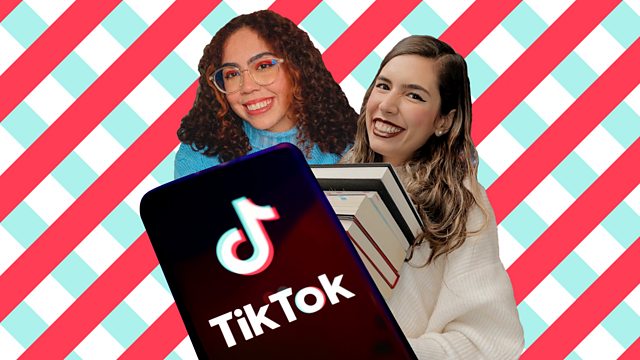The rise of #BookTok
#BookTok is a very popular community on TikTok, with over 127 billion views of the hashtag as of April 2023. If you open the app, filter, and scroll, it’s not difficult to see why people enjoy this content. Countless colourful thumbnails show videos of ‘BookTokkers’ sharing their literary recommendations; people suggesting next reads to those who enjoyed a particular title; people showing off their shopping hauls; and shared stories of relatable “bookworm moments,” like finishing your holiday reads before you’ve even boarded your plane. The internet has decided that reading is cool now. And the book industry is shifting to accommodate the rapid-fire, ever-shifting nature of #BookTok, making as many sales as possible by surfing trend waves.
The shareability and community aspect of #BookTok has helped some previously less successful authors generate huge sales and receive levels of attention previously unimaginable to them. The account @stonemaidens exemplifies the power of TikTok for turning around an author’s success. Run by the daughter of author Lloyd Devereux Richards, the account’s first video shares his story. After spending 14 years writing a book on the side whilst working full-time and raising his children, his novel Stone Maidens received modest sales when it was published in 2012. In the video captions, his daughter says: “He’s so happy even though sales aren’t great. I’d love for him to get some sales. He doesn’t even know what TikTok is.” After going viral, the comment section is flooded with users endeared by the wholesome clips of Richards working at his desk, claiming they’ve already placed their order on Amazon. The storefront webpage goes so far as to call him a “TikTok sensation,” showing how, thanks to the power of the #BookTok community, one man’s passion project novel has finally paid off.
Astonishingly, Hoover outsold the Bible in 2022, a breath-taking statistic testifying #BookTok’s influence on the book industry.
Colleen Hoover is one of #BookTok’s most compelling success stories. Writing for the TIME Magazine’s list of 100 most influential people of 2023, Jenna Bush Hager states that Hoover’s “rise on #BookTok […] has motivated an entire generation of readers back to bookstores and libraries.” Astonishingly, Hoover outsold the Bible in 2022, a breath-taking statistic testifying #BookTok’s influence on the book industry. It is also interesting to note that her most popular novel, It Ends With Us, was first published in 2016—providing another example of a less-than-recent title receiving a considerable sales boost thanks to conversations over on #BookTok.
In January 2023 Atria Books, one of Hoover’s publishers, announced The Official It Ends With Us Colouring Book, announced back in January 2023. Unsurprisingly, the decision to make an adult colouring book based on a novel that deals with domestic abuse came under fire; the project was cancelled. Hoover’s faux pas exposes the capitalistic reasons why the book industry listens to #BookTok; the threat of such a goldmine of an author being cancelled alarmed Atria enough to immediately backtrack, not wanting to lose the respect of #BookTok and its endlessly deep pockets.
You’ve got to dig to find smaller accounts promoting second-hand book buying, but when you do, their shelves of eclectically mismatched books reveal much more sustainable purchasing habits than the majority of #BookTok videos do.
Indeed, #BookTok has faced its fair share of criticism for its consumerist elements. Scrolling through the hashtag, one sees countless shopping vlogs, book hauls, and book unhauls (deciding which books, that you may or may not have read, you no longer have shelf space for). What’s more, Waterstones and Barnes & Noble both had partnership schemes with the #BookTok community last summer, contributing to the idea that #BookTokkers prefer their books in photogenic mint condition. I’m sure any student will agree with me that brand-new copies are pricey. They can also waste resources, considering how many second-hand books are readily available on sites like Amazon and World of Books in great condition, and at a heavily reduced price. You’ve got to dig to find smaller accounts promoting second-hand book buying, but when you do, their shelves of eclectically mismatched books reveal much more sustainable purchasing habits than the majority of #BookTok videos do.
Writing for GQ Magazine, Barry Pierce calls #BookTok a “shallow world” full of influencers more concerned with how they appear as readers, rather than how they are critically engaging with their material. Performative readership on #BookTok, he says, means that there is an “uncanny falseness behind it all, a showy nothingness that only approximates bibliophilia.” Of course, there are always going to be people who judge (and buy) a book for its cover, but at its core, most of the content on #BookTok gets people interested in reading books and starting literary discussions, which can rekindle a hobby or ignite a lifelong habit. Books are good for you—literally—and in my view, if #BookTok introduces people to the wonderful world of reading, then it’s something we should celebrate and support.

Comments (1)
What’s also intriguing is how BookTok has diversified reading choices and introduced a wider range of voices and perspectives. It’s breaking down barriers and encouraging people to explore genres and authors they might not have considered before.
As someone who’s always looking for the next great read, I’m grateful for the BookTok phenomenon. It’s like having a massive book club right at your fingertips, and I’ve discovered some fantastic novels thanks to these enthusiastic bookworms.